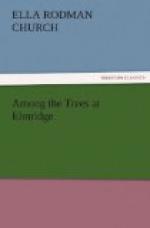[Illustration: THE ALMOND.—BRANCH AND FRUIT.]
“But what do they want to find it for,” asked Malcolm, “when it kills people?”
“Because,” replied his governess, “like some other noxious things, it can be made valuable when used moderately and in the right way. But it is often employed to give a flavor to intoxicating liquors, and this is not a right way, as it makes them even more dangerous than before. But we will leave the prussic acid and return to our almond tree. It flourishes in Palestine, where it blooms in January, and in March the ripe fruit can be gathered.”
This seemed wonderfully strange to the children—flowers in January and fruit in March; and Miss Harson explained to them that in that part of the world they do not often have our bitter cold weather with its ice and snow to kill the tender buds.
“This tree,” continued Miss Harson, “is occasionally mentioned in the Old Testament. In Jeremiah the prophet says, ’I see a rod of an almond tree[13];’ also in Ecclesiastes it is said that ’the almond tree shall flourish[14].’”
[13] Jer. i. II.
[14] Eccl. xii. 5.
“Are there ever many peach trees growing in one place,” asked Clara, “like the apple trees in Mr. Grove’s orchard?”
“Yes,” was the reply, “for in some places there are immense peach-orchards, covering many acres of ground; and when the trees in these are in blossom, the spring landscape seems to be pink with them. These great peach-fields are found in Delaware and Maryland, where the fruit grows in such perfection, and also in some of the Western States. We all know how delicious it is, but, unfortunately, so does a certain green worm, who curls up in the leaves which he gnaws in spite of the prussic acid. This insect will often attack the finest peaches and lay its eggs in them when the fruit is but half grown. In this way the young grubs find food and lodging provided for them all in one, and they thrive, while the peach decays.”
“What a shame it is,” exclaimed Malcolm, in great indignation, “to have our best peaches eaten by wretched little worms who might just as well eat grass and leave the peaches for us!”




